| Listing 1 - 10 of 32 | << page >> |
Sort by
|
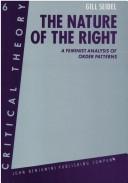
ISBN: 1283358867 9786613358868 9027278725 9789027278722 1556190360 1556190441 9789027224118 9027224110 Year: 1988 Publisher: Amsterdam Philadelphia J. Benjamins Pub. Co.
Abstract | Keywords | Export | Availability | Bookmark
 Loading...
Loading...Choose an application
- Reference Manager
- EndNote
- RefWorks (Direct export to RefWorks)
This volume challenges and extends the definition of right and right-wing discourse as traditionally conceived in male scholarship. The eleven papers share a common perspective: a critique of the ideology of 'natural difference' as the basis for oppression of the dominated group. In a radical feminist analysis, the relation of domination between the sexes is seen as central to the projects of the right, in which the constructions of 'nations', 'races' and 'gender' present variations in time and space. In its linking of oppressions, this books makes an important and timely contribution to femin
Discourse analysis --- Sexism in language --- Feminism --- Right and left (Political science) --- Sexist language --- Language and sex --- Language and languages --- Nonsexist language --- Sex differences --- Congresses --- Sexism in language - Congresses.
Book
ISBN: 0231063105 0231063113 Year: 1986 Publisher: New York (N.Y.): Columbia university press
Abstract | Keywords | Export | Availability | Bookmark
 Loading...
Loading...Choose an application
- Reference Manager
- EndNote
- RefWorks (Direct export to RefWorks)
82:396 --- Sexism in language --- -Women and literature --- -Literature --- Sexist language --- Language and sex --- Language and languages --- Nonsexist language --- Literatuur en feminisme --- Congresses --- Sex differences --- -Literatuur en feminisme --- 82:396 Literatuur en feminisme --- -82:396 Literatuur en feminisme --- -Sexist language --- Women and literature
Book
ISBN: 3839444349 9783839444344 9783837644340 Year: 2018 Publisher: Bielefeld transcript Verlag
Abstract | Keywords | Export | Availability | Bookmark
 Loading...
Loading...Choose an application
- Reference Manager
- EndNote
- RefWorks (Direct export to RefWorks)
What exactly is rape? And how is it embedded in society? Hilkje Charlotte Hänel offers a philosophical exploration of the often misrepresented concept of rape in everyday life, systematically mapping out and elucidating this atrocious phenomenon. Hänel proposes a theory of rape as a social practice facilitated by ubiquitous sexist ideologies. Arguing for a normative cluster model for the concept of rape, this timely intervention improves our understanding of lived experiences of sexual violence and social relations within sexist ideologies.
Rape --- Assault, Criminal (Rape) --- Assault, Sexual --- Criminal assault (Rape) --- Nonconsensual sexual intercourse --- Sexual assault --- Offenses against the person --- Sex crimes --- Rape; Feminist Philosophy; Social Structures; Sexist Ideology; Sexual Violence; Violence; Gender; Social Philosophy; Gender Studies; Analytical Philosophy; Philosophy --- Analytical Philosophy. --- Feminist Philosophy. --- Gender Studies. --- Gender. --- Philosophy. --- Sexist Ideology. --- Sexual Violence. --- Social Philosophy. --- Social Structures. --- Violence.
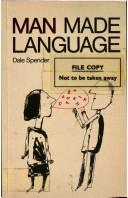
ISBN: 0710006756 9780710006752 Year: 1981 Publisher: London Routledge and Kegan Paul
Abstract | Keywords | Export | Availability | Bookmark
 Loading...
Loading...Choose an application
- Reference Manager
- EndNote
- RefWorks (Direct export to RefWorks)
Sexism in language --- Language and languages --- Sex differences --- -Foreign languages --- Languages --- vrouwen --- Sociolinguistics --- taalsociologie --- Language and sex --- Sexist language --- Nonsexist language --- Sexism in language. --- Sex differences. --- Language and languages - Sex differences --- Language use --- Women's literature --- Book
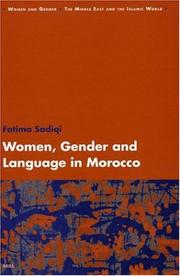
ISBN: 9004128530 9789004128538 1423755448 9781423755449 1280914718 9786610914715 9047404378 Year: 2003 Publisher: Leiden Boston
Abstract | Keywords | Export | Availability | Bookmark
 Loading...
Loading...Choose an application
- Reference Manager
- EndNote
- RefWorks (Direct export to RefWorks)
This volume deals with the complex but poorly understood relationship between women, gender, and language in Morocco, a Muslim, multilingual, multicultural, and developing country. The hypothesis on which the book is based is that an understanding of gender perception and women's agency can be achieved only by taking into account the structure of power in a specific culture and that language is an important component of this power. In Moroccan culture, history, geography, Islam, orality, multilingualism, social organization, economic status, and political system constitute the superstructures of power within which factors such as social differences, contextual differences, and identity differences interact in the daily linguistic performances of gender. Moroccan women are far from constituting a homogeneous group, consequently the choices available to them vary in nature and empowering capacity, thus 'widening' the spectrum of gender beyond cultural limits.
Arabic language --- Berber languages --- Language and culture --- Sexism in language --- Women --- Sex differences --- Sex differences. --- Morocco. --- Language. --- Sexist language --- Language and sex --- Language and languages --- Nonsexist language --- Culture and language --- Culture --- Libyan languages --- Afroasiatic languages --- Semitic languages

ISBN: 9786612268984 1282268988 0299171337 9780299171339 0299171302 9780299171308 0299171345 9780299171346 6612268980 9781282268982 Year: 2001 Publisher: Madison (Wis.): University of Wisconsin press
Abstract | Keywords | Export | Availability | Bookmark
 Loading...
Loading...Choose an application
- Reference Manager
- EndNote
- RefWorks (Direct export to RefWorks)
English language
---
Masculinity
---
Sexism in language
---
Men
---
Sexist language
---
Language and sex
---
Language and languages
---
Nonsexist language
---
Human males
---
Human beings
---
Males
---
Effeminacy
---
Germanic languages
---
Sex differences
---
Language
---
Psychological aspects.
---
#BIBC:ruil
Book
ISBN: 9780521807111 9780521001748 9780511755033 0511429339 9780511429330 9780511429712 0511429711 0521001749 0521807115 1107194938 1281791245 9786611791247 0511428146 0511427530 0511755031 0511428855 9781107194939 9781281791245 6611791248 9780511428142 9780511427534 9780511428852 Year: 2008 Publisher: Cambridge Cambridge University Press
Abstract | Keywords | Export | Availability | Bookmark
 Loading...
Loading...Choose an application
- Reference Manager
- EndNote
- RefWorks (Direct export to RefWorks)
The issue of sexist language has been hotly debated within feminist circles since the 1960s. Previous books have tended to regard sexism in language as easy to identify and have suggested solutions to overcome and counter sexism. Sara Mills takes a fresh and more critical look at sexism in language, and argues that even in feminist circles it has become a problematic concept. Drawing on conversational and textual data collected over the last ten years, and with reference to recent research carried out in a range of different academic disciplines, Mills suggests that there are two forms of sexism - overt and indirect. Overt sexism is clear and unambiguous, while indirect sexism is based on pragmatics and the meaning and interpretation of utterances. Indirect sexism is extremely common and we therefore need new ways to challenge and analyse its usage in language.
Sociology of the family. Sociology of sexuality --- Sociolinguistics --- Sexism in language. --- Language and languages --- Language and sex --- Sexism in language --- Sexist language --- Nonsexist language --- Sex differences. --- Sex differences --- Arts and Humanities --- Language & Linguistics
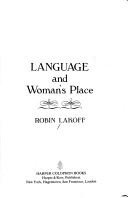
ISBN: 0060903899 Year: 1975 Publisher: New York (N.Y.) Harper and Row
Abstract | Keywords | Export | Availability | Bookmark
 Loading...
Loading...Choose an application
- Reference Manager
- EndNote
- RefWorks (Direct export to RefWorks)
316:80 --- English language --- -Sex role --- Sexism in language --- Women --- -Human females --- Wimmin --- Woman --- Womon --- Womyn --- Females --- Human beings --- Femininity --- Sexist language --- Language and sex --- Language and languages --- Nonsexist language --- Gender role --- Sex (Psychology) --- Sex differences (Psychology) --- Social role --- Gender expression --- Sexism --- Germanic languages --- Sociologie --(algemeen)-:-?80 --- Sex differences --- Language --- Sex role. --- Sexism in language. --- Sex differences. --- Language. --- 316:80 Sociologie --(algemeen)-:-?80 --- -Sociologie --(algemeen)-:-?80 --- -Sexist language --- Human females --- Psycholinguistics --- Sociolinguistics --- Sociology of the family. Sociology of sexuality --- Sex role --- Social aspects --- Gender roles --- Gendered role --- Gendered roles --- Role, Gender --- Role, Gendered --- Role, Sex --- Roles, Gender --- Roles, Gendered --- Roles, Sex --- Sex roles --- Language use --- Linguistic sexism --- Book
Book
ISBN: 0585064954 9780585064956 143841580X Year: 1987 Publisher: Albany, N.Y. : State University of New York Press,
Abstract | Keywords | Export | Availability | Bookmark
 Loading...
Loading...Choose an application
- Reference Manager
- EndNote
- RefWorks (Direct export to RefWorks)
Women --- Sexism in language. --- Feminism --- Language planning --- Sociolinguistics --- English language --- Language and languages --- Planned language change --- Sexist language --- Language and sex --- Nonsexist language --- Human females --- Wimmin --- Woman --- Womon --- Womyn --- Females --- Human beings --- Femininity --- Language. --- Sex differences. --- Social aspects --- Planning --- Sex differences --- Germanic languages --- Language and culture --- Linguistics --- Sociology --- Integrational linguistics (Oxford school)
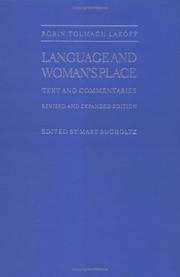
ISBN: 0195167570 0195167589 9786612366987 9786610535453 1280535458 128236698X 019534717X 0199883300 9780195347173 0197721869 Year: 2023 Publisher: New York ; Oxford University Press,
Abstract | Keywords | Export | Availability | Bookmark
 Loading...
Loading...Choose an application
- Reference Manager
- EndNote
- RefWorks (Direct export to RefWorks)
Widely recognized as having inaugurated feminist research on the relationship between gender and language, this revised edition includes an introduction and annotations by the author in which she reflects on some of the most widely discussed issues it raises.
English language --- Sex role. --- Sexism in language. --- Women --- Sex differences. --- Language. --- Sexist language --- Language and sex --- Language and languages --- Nonsexist language --- Gender role --- Sex (Psychology) --- Sex differences (Psychology) --- Social role --- Gender expression --- Sexism --- Social aspects --- Sex differences --- Germanic languages --- Gender roles --- Gendered role --- Gendered roles --- Role, Gender --- Role, Gendered --- Role, Sex --- Roles, Gender --- Roles, Gendered --- Roles, Sex --- Sex roles
| Listing 1 - 10 of 32 | << page >> |
Sort by
|

 Search
Search Feedback
Feedback About UniCat
About UniCat  Help
Help News
News